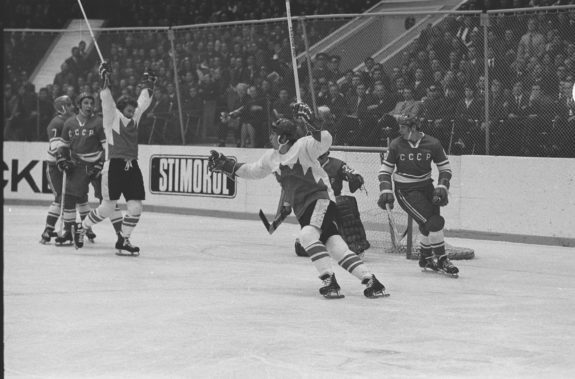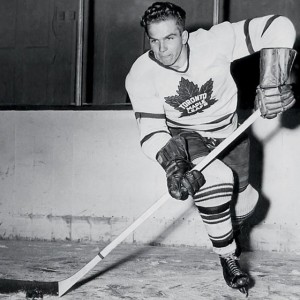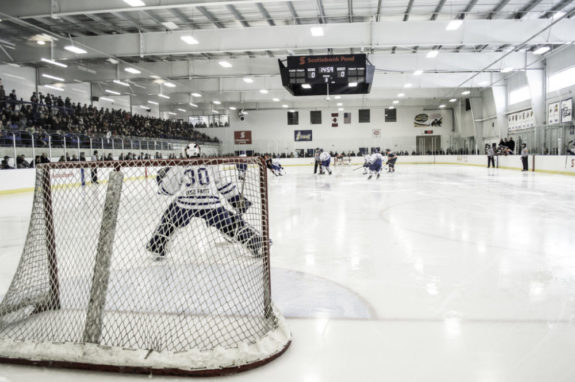Gord Downie, the powerful, enigmatic and wonderfully quirky Canadian singer-songwriter passed away Oct. 17, 2017. It wasn’t a surprise to anyone. He chose to make his brain cancer diagnosis public in May 2016. That summer, he underwent an emotional and exhausting tour with his band The Tragically Hip. The finale in Kingston, Ontario was described by the New York Times as “an unparalleled moment of national pride laced with sorrow.” (from ‘Gord Downie, Frontman for the Tragically Hip, in His Final Act,’ New York Times, 08/22/2016)
I let my kids stay up late to watch the first set. I cried like a baby as I watched Downie kiss his bandmates and crew in appreciation and slowly mouth the words “I love you” directly into a camera during one of the Hip’s signature jams. It was an intimate moment. Millions shared it. I’m not sure if you need to be Canadian to understand Downie and the Hip. It helps if you like hockey though.
I am not the first to try and connect Gord, hockey, and music. Justin Cuthbert did something similar previously. Bob McKenzie released an excerpt of his 2014 book, Hockey Confidential, in which he traced the history of the Tragically Hip and hockey. I came to those pieces only after I started writing this one. To me, the power of his lyrics and of the meaning of the songs justify retracing some of these steps.
I hope you agree.
Hockey and Music
Gord Downie was a Bruins fan. This was no doubt influenced by his godfather Harry Sinden, former coach of the Boston Bruins. Downie famously wore his Boston jersey in the music video for Courage (for Hugh MacLennan). The Hip were unapologetically Canadian. Hockey, as a central part of Canadian identity, found its way into many of their songs.
The 1972 Summitt Series
Fireworks is the third single from the Hip’s sixth studio album, Phantom Power. The song references the 1972 Summit Series, hockey legend Bobby Orr. The ’72 summit series was a great moment for Canada and Paul Henderson’s series-winning goal is the most famous goal in Canadian hockey history. It was the defining moment for a generation.

The song is also about growing up and about the first flush of love that can displace even the great Orr. Considered one of the greatest hockey players of all time, Orr was a defenseman for Sinden’s Bruins (of course). He won the Stanley Cup twice, first with his famous flying Cup-winning goal in 1970.
Related: Top 10 Montreal Canadiens Goal Celebrations
If there’s a goal that everyone remembers
It was back in old seventy-two
We all squeezed the stick and we all pulled the trigger
And all I remember is sitting beside you
You said you didn’t give a [expletive] about hockey
And I never saw someone say that before
You held my hand and we walked home the long way
You were loosening my grip on Bobby Orr
– Fireworks (Album, Phantom Power, 1998)
The song’s chorus refers to fireworks exploding in the distance, emulating heaven, and replacing stars. Downie remarked that the inspiration for these lyrics came from his critical assessment of the music industry. The industry too often created pop stars and flashes-in-the-pan in the hopes of cashing in on the latest fad and obscuring real music.
Bill Barilko
The story of Bill Barilko is a strange one. (from ‘The 11-year mystery of Leafs’ ‘Bashin’ Bill Barilko’,’ Toronto Star, 06/01/2017) That it inspired Downie to write a song that combined the mystery of Barilko’s disappearance with a cap given to elite bomber pilots of the allied air forces during World War II is even stranger. The song is a gem.
Downie explained to Steve Newton in 1992 that he liked a different angle to the story: “In World War II when you were a new pilot, you’d be given a new hat. Of course, you’d work it in to look like a fifty mission cap so as to appear that you had more experience than you really did.”

Bill Barilko disappeared that summer,
He was on a fishing trip.
The last goal he ever scored
Won the Leafs the cup
They didn’t win another until 1962,
The year he was discovered.
I stole this from a hockey card,
I keep tucked up under
My fifty mission cap, I worked it in
To look like that
– 50 Mission Cap (Album, Fully Completely, 1993)
When The Tragically Hip played Maple Leaf Gardens or the Air Canada Centre and got to Fifty Mission Cap on the setlist, Bill Barilko’s No. 5 banner would be spotlighted in the rafters. (from ‘What did Gord Downie mean to hockey? Ask the Toronto Maple Leafs — or fans of Bill Barilko,’ National Post, 10/18/2017)
Related: A Look Back at the Career of Jimmy Thomson
Fifty Mission Cap is part of the Leafs’ game-night playlist today. In 2001, Downie presented the Leafs with the hand-written lyrics to Fifty Mission Cap. They were placed in the Leafs dressing room. As CBC reported, the Toronto Maple Leafs and fans honored Downie with a moment of silence before their game against the Detroit Red Wings this week.
Dan Snyder and Unsung Service
Downie wrote a song after the death of former Atlanta Thrashers forward Dan Snyder. Snyder died in a car crash when his then-teammate, Dany Heatley, lost control at the wheel. As Justin Cuthbert points out: Downie tributes Snyder while also paying homage to those who serve their country. Snyder’s mother, LuAnn Snyder, said “the Tragically Hip were so kind and caring to our family. We will never forget Gord.”
Snyder was a fan of the band, having seen The Hip in Atlanta in Oct. 2002. As an undrafted player, he spent more time in the AHL than the NHL, was beloved by his teammates. He was a “glue guy,” someone who brought people together and made them stick.
Scott Desveaux described Snyder as a player who did the “little things that may not show up on the stat sheet. Off the ice they are more likely to be getting vocal from the bench, keeping morale high during warmup/intermissions, doing little things to help with team-building…”
Here’s a glue guy, a performance god
A makeshift shrine, or newly lain sod
Hardly even trying, gives the nod
I sure hope I’m not the type to dwell
Hope I’m a fast healer, fast as hell
Heaven is a better place today
Because of this, but the world is just not the same
– Heaven is a Better Place Today (In Between Evolution, 2004)
The Lonely End of the Rink
Downie was a hockey player. Bob McKenzie noted that in the 1990s and early 2000s, the boys in the Hip would go to great lengths while touring to organize hockey games. Sometimes it was just ball hockey in an arena parking lot. More often it involved finding ice and equipment to play a game with the crew. In The Lonely End of the Rink, Downie wrote about playing goal and the most important job in hockey.
Oh to join the rush
As the season builds
I hear your voice ‘cross a frozen lake
a voice from the end of a leaf
saying, ‘you won’t die of a thousand fakes
or be beaten by the sweetest of dekes’
At the lonely end of the rink, you and me
At the lonely end of the rink, the lonely end of the rink
- The Lonely End of the Rink (World Container, 2006)
The Times observed that the “place of honor that Mr. Downie occupied in Canada’s national imagination has no parallel in the United States. Imagine Bruce Springsteen, Bob Dylan, and Michael Stipe combined into one sensitive, oblique poet-philosopher, and you’re getting close.”

For many, the last time they saw Downie was him standing alone on stage at the end of the set, waving. He was waving goodbye. It was a strangely intimate moment that transcended distance and disease. Gord gave us music. He gave us meaning. Downie helped us understand ourselves through the music he made. He will be missed.
Heaven is a better place today
Because of this, but the world is just not the same
